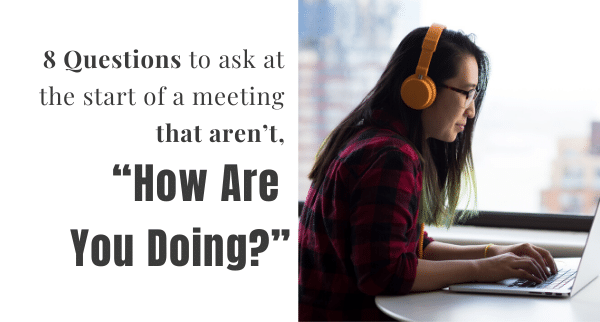By Dr. Sarah Glova and Dr. Sarah Egan Warren
“How are you doing?” Nice of you to ask, especially with everything going on. But, hmm… how am I doing? Fine. Terrible. Grateful? Scared. Well, it’s always harder on Thursdays—oh, is it Tuesday? Other than trying to keep the days of the week straight… and, you know, work from home during a major pandemic, homeschool my kids, cook three meals a day, and empty the dishwasher approximately 30,000 times a week… I’m sorry, I know I’m lucky that these are my only problems right now. It could be much worse. We are healthy, with a fridge full of groceries and great Internet… we even have some spare toilet paper. I feel guilty complaining at all, knowing others don’t have those things. Anyway… what did you ask, again?
Life is complex right now, so, “How are you doing?” doesn’t have simple answers. While it’s natural to want to check in with others, a 30-minute work meeting might not be the best time for this Pandora box.
Want to check on the wellbeing of colleagues, clients, family, friends? Then set a specific time to do so, and let the person know that your goal is to call and hear how they’re doing.
But if you’re just trying to kick off a meeting in a welcoming way, let’s think about some alternatives to the too-complex “How are you doing?”. Here are 8 suggestions you can mix and match to help start your work conversations in a friendly, less stressful way.
1. “Borrow” questions from a scrum daily stand-up meeting.
In an agile project management approach, there is a daily stand-up meeting that is meant to be short, thus the name “stand-up.” We’re not talking comedy open mic, we’re talking meetings so short that participants don’t even sit.
Everyone answers three quick questions:
- What did you accomplish yesterday?
- What will you do today?
- What obstacles are impeding your progress?
Those questions make up the entire stand-up meeting. But, those questions could be used at the start of any meeting.
When using these questions outside of an agile environment, the answers don’t have to stay focused on work. What did I accomplish? “Well, I did three loads of laundry.” (How is there so much laundry?). What will I do today? “More laundry!” What obstacles are impeding my progress? “The pile of laundry that seems to multiply despite that fact we are all wearing our PJs.”
2. What shows are you bingeing?
We are in a moment in time when it is a public service to stay inside, sit on your sofa, and watch ALL the tv. Binge-watching isn’t lazy—it’s hero work. So kick off your next meeting by asking what everyone’s watching.
If it’s a big meeting, use a poll to find out who’s obsessed with Tiger King, who’s revisiting Seinfield or Scandal, or who’s rediscovered the Clone Wars cartoon. Sympathize with parents who are thankful for Frozen 2 and Moana but horrified at how many times they’ve seen them.
If it’s a small meeting, this can be a fun way to check who’s in the room. (And to get everyone practicing those mute/unmute best practices…)
3. What did you do for yourself yesterday?
Bloomberg reported in March that remote workers are working two hours extra per day as a result of social-distancing policies. So ask people how they’re taking care of themselves—encourage self-care trends!
People can share if they went on a walk, enjoyed their favorite dessert, joined in on the bread baking craze…
This is a great question to remind your team—you hope everyone is taking care of themselves, and taking time to recharge their batteries. (And feed their sourdough starter.)
4. What are you making for dinner tonight?
Because (1) let’s be honest, we could all use ideas, and (2) food is a light, easy conversation topic.
5. What are you reading?
And we mean what are you reading other than increasingly alarming news reports. (You may even want to specify this when you open the question.)
What are people reading to escape? Who has a passion for non-fiction? Who’s finally reading the Dune series, or trying to get through Little Fires Everywhere before catching it on Hulu? Anyone rereading a classic or a childhood favorite?
The great thing about questions like these—everyone doesn’t have to answer. You can just ask the group.
“Good morning, everyone! Excited to get started today. First, something fun – anyone reading anything interesting? You know, other than the news? I’m looking for my next book.”
That way, people can answer or opt out. (These are difficult days, y’all—if Michael isn’t reading anything good right now, don’t make him stress-Google a fake answer. If you’re using these as icebreakers, keep them light and optional.)
6. How is your dog/cat/pet doing?
Pets are doing important work right now—photobombing Zoom calls, taking their owners on 10 walks a day… acknowledge your pet-owning coworkers by asking about Fluffy.
7. What has been your best experience with take out or grocery services?
Anyone worked with an Instacart shopper who deserves a Congressional Gold Medal for their service? Got a favorite local restaurant that’s rocking their curbside delivery?
Sharing local restaurant recommendations could help boost your neighborhood economy. If your team isn’t all in the same city, give everyone on the call a chance to shoutout some of their go-to to-go services. (Wine delivery for the win!)
8. What is your word of the day?
Remember on Sesame Street, how each episode was “brought to you by the letter___ and the number ___”? What if your team had a word of the day as your theme?
All participants could share their words, and you could capture them in your notes or even create a word cloud.
The word could be something to inspire you: “patience.”
Or it could be how a project is going: “slowly.”
The word could be a feeling: “optimistic.”
This is a great way to get everyone talking at the beginning of the meeting, but it also keeps the introductions and welcome message short—perfect for those 30-minute Zooms.
###
Remember—the goal is to get away from the “How are you doing?” trap. But mix it up! If you start every meeting by asking people what they’re binge-watching, people might get tired of Carole Baskin gossip. So, try out different questions and customize them to your group. If you’re using the questions as a way to roll call or to hear from everyone in the beginning, keep it fun but specific, that way introductions don’t take up a third of the meeting. If you’re just using the questions as icebreakers, allow people a chance to opt-out.
And who knows—these more specific kickoff questions might just save enough time to allow for real, higher-quality conversations with team members during the meeting.
###
This article was co-written by Dr. Sarah Glova, CEO of Reify Media and the VP of Client Solutions at BLDG-25, and Dr. Sarah Egan Warren, Head of Technical Communication at the Institute for Advanced Analytics at NC State University. The two Sarahs have been collaborating on instructional design, teaching, online learning, public speaking, training and development, and instructional technology since 2009.
###
Want to continue the conversation? Check out this follow-up article: “I stopped asking, ‘How are you?’ for a month. You’ll never believe what happened” written by Katherine Tobin, the Director of the Lateral Innovation Division within the Office of the Director of National Intelligence in Washington DC. Katherine shares how her team started asking new questions, and she shares an innovative strategy for getting the team involved in meeting kickoffs. Don’t miss it!




























